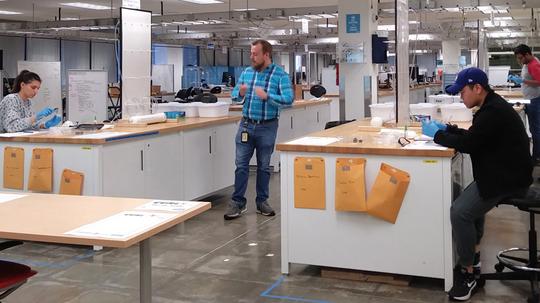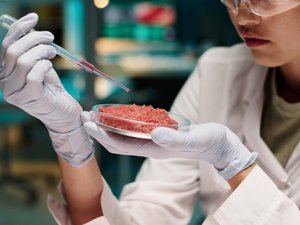
Amidst the pandemic, local founders, entrepreneurs and innovators have been putting their talents to work to help create protective gear and solutions to slow the spread of the virus. And to expedite the process, a local university is pooling its resources in one place.
Through its UTDesign Studio and partnerships with the North Texas health and technology community, UT Dallas has created the COVID-UT Dallas Response Lab, which has been churning out research, 3D-printed PPE and other technologies to protect frontline workers and prevent further spread of Covid-19 in the community.
Other local partners on the project include UT Southwestern, Parkland Health & Hospital System, Texas Instruments and Unique Software Development.
“I wanted to do more than cheering on doctors and nurses on the sidelines as they are working tirelessly on the front lines,” said Khoa Nguyen, response lab volunteer and biology senior, in a prepared statement. “Working in the lab gave me a sense of purpose and fulfillment knowing that I’m contributing to our fight against COVID-19 no matter how small or large it might be.”

Under normal conditions, the UTDesign Studio functions as a place for senior engineering students to work. However, with the pandemic shutting down UTD’s and many other universities’ campuses, the space has become a hub of volunteers working on a number of virus-relate projects.
One of the main functions of the response lab is 3D printing PPE, an effort largely led by associate professor of material science and engineering and founder and CEO of UTD-launched Adaptive 3D Technologies Walter Voit, who also runs the Advanced Polymer Research Lab there.
Under his guidance and with a nationwide collaboration of universities 3D printing PPE, 3D Corps, teams at the Richardson university are developing a number of products. One initiative involves positive end-expiratory pressure valves to help hospitals with ventilator shortages. The team is currently seeking approval from the FDA to begin distribution to hospitals. Other 3D printing efforts taking place at the response lab include an air purifying respirator, face shields and other ventilator parts, as well as an effort to make ventilator out of scuba masks led by James Griffin, CEO and founder of health care software startup Invene.
This is what engineering is all about,” said Rod Wetterskog, assistant dean of corporate relations for the Erik Jonsson School of Engineering and Computer Science and director of the UTDesign Studio, in a prepared statement. “First to understand the need of the customer, in this case our local hospitals and the needs of their patients, then rally all skills and resources needed to design, test, fail, redesign and finally succeed in a solution. Our faculty and students have worked side by side… to get these devices manufactured, tested and in the hands of care providers.”

However, 3D printing isn’t the only thing going on at the COVID-UT Dallas Response Lab. Teams there are also working on a nasal swab that can be used to quickly detect the virus in patients.
Outside of the Covid-19 response lab, other UTD faculty and students have been joining in the effort to fight the virus. Last week, three UTD student projects, along with two others from SMU, were selected as winners of the $5,000 RevTech SAFE Schools grant – a program by Dallas-based RevTech Ventures aimed at stopping the spread of infectious diseases on campus. Winners included Shop Ticketing System, an app that looks to limit the amount and movement of people in a given space or shop; SaniScanner, a sterilization system using low-cost UV-C technology at checkout counters that can protect against a number of infectious diseases; and CampusOven, a newly-launched on-demand delivery startup.
Elsewhere, UTD’s Center for BrainHealth has been hosting the BrainHealth Boost Series, offering science-based tips on productivity and mental wellness during the pandemic.
“A college education is about more than what occurs in the classroom, and this project demonstrates the creativity and engineering expertise that our students can contribute to solve real-world problems,” said Stephanie G. Adams, dean of the Jonsson School and Lars Magnus Ericsson chair, in a prepared statement.








